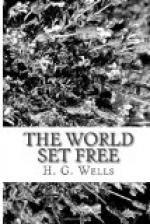For the whole world was flaring then into a monstrous phase of destruction. Power after Power about the armed globe sought to anticipate attack by aggression. They went to war in a delirium of panic, in order to use their bombs first. China and Japan had assailed Russia and destroyed Moscow, the United States had attacked Japan, India was in anarchistic revolt with Delhi a pit of fire spouting death and flame; the redoubtable King of the Balkans was mobilising. It must have seemed plain at last to every one in those days that the world was slipping headlong to anarchy. By the spring of 1959 from nearly two hundred centres, and every week added to their number, roared the unquenchable crimson conflagrations of the atomic bombs, the flimsy fabric of the world’s credit had vanished, industry was completely disorganised and every city, every thickly populated area was starving or trembled on the verge of starvation. Most of the capital cities of the world were burning; millions of people had already perished, and over great areas government was at an end. Humanity has been compared by one contemporary writer to a sleeper who handles matches in his sleep and wakes to find himself in flames.
For many months it was an open question whether there was to be found throughout all the race the will and intelligence to face these new conditions and make even an attempt to arrest the downfall of the social order. For a time the war spirit defeated every effort to rally the forces of preservation and construction. Leblanc seemed to be protesting against earthquakes, and as likely to find a spirit of reason in the crater




